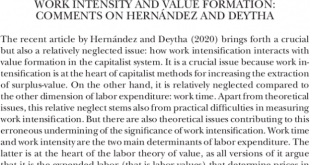In the forthcoming issue of Science & Society it is included a paper by Alexis Ioannides and Stavros Mavroudeas commenting on a recent contribution by Hernandez and Deytha. The full reference of the paper is: Ioannides A. & Mavroudeas S. (2021), ‘Work Intensity and Value Formation: Comments on Hernández and Deytha’, Science & Society Vol. 85, No. 1 The link for the Science & Society issue is the following: https://guilfordjournals.com/toc/siso/85/1...
Read More »A Marxist agrees with me on the Labour Theory of Value and Fiat Money!
Well, sort of agrees in the post that can be read here: Jehu, “Reply to LK: How Labor Theory of Value destroys Fiat ‘Money’,” The Real Movement, June 12, 2015. My original post is here.We must remember that for Marx money is a special commodity that itself must have a labour value so it can function as a universal medium of exchange and numéraire. That is the basis by which money can exchange for other produced commodities under the law of value in volume 1 of Capital. But fiat money...
Read More »Louis Boudin on the Contradiction between Volumes 1 and 3 of Marx’s Capital
From Louis Boudin’s book The Theoretical System of Karl Marx in the Light of Recent Criticism (1920): “The appearance in 1894 of the third volume of Capital created a sensation in interested circles. While it does not stand in any direct relation to the Revisionist movement, it can hardly be denied that it made its formal argumentation more plausible. The solution of the Great Contradiction contained in the third volume, and the rest of the matter therein contained and intimately connected...
Read More »The Critical Responses to Volume 3 of Marx’s Capital and the Early Development of Marxism
Marx published volume 1 of Capital in 1867. He never published any further volumes of the work in his lifetime. Early reviews and critiques of volume 1 included Eugen Dühring (1867; 1871; 1875), Carl Knies (1873), Maurice Block (1872; 1884a; 1884b), Wilhelm Roscher (1874), Achille Loria (1884), Eugen von Böhm-Bawerk (1884); Philip H. Wicksteed (1884 = Wicksteed 1933), Richard Theodore Ely (1883), George Bernard Shaw (1885), Knut Wicksell (1893 = Wicksell 1954) and Vilfredo Pareto (1893).In...
Read More »Alexander Gray on the Two Contradictions in Marx’s Theory of Surplus Value in Volume 1 of Capital
From Alexander Gray’s book The Development of Economic Doctrine: An Introductory Survey (1956): “… the Marxian explanation suffers from two inner inherent contradictions (or two aspects of the same contradiction) from which it never escaped, and on which it finally made shipwreck in the third volume. In the first place, if all profit springs from variable capital and none from machinery, then it is the height of folly ever to introduce machinery, and it is a poor explanation to suggest that...
Read More »“Socially Necessary Labour Time is the only Source of Value”: What Does this even Mean?
The following proposition is asserted as true by Marxists (e.g., Foley 1986: 16): Proposition 1: Socially necessary labour time is the only source of value. Marx asserted this numerous times, though not necessarily in these words, and here are some examples: “A use-value, or useful article, therefore, has value only because human labour in the abstract has been embodied or materialised in it. How, then, is the magnitude of this value to be measured? Plainly, by the quantity of the...
Read More »Rudolf Hilferding on the Law of Value in Volume 1 of Capital
In 1904, Rudolf Hilferding wrote a response to Böhm-Bawerk (1896) called “Böhm-Bawerk’s Criticism of Marx” (Hilferding 1949 [1904]).In this essay of Hilferding, we have a fascinating confirmation of the way in which the early Marxists were concerned to still vindicate the law of value in volume 1 of Capital – the idea that commodities tend to exchange at pure labour values – as an empirical theory.Like Engels, they seized on Marx’s statement in Chapter 10 of volume 3 of Capital as follows:...
Read More »More on Engels’ Supplement to Volume 3 of Capital
It was in the spring of 1895 that Engels wrote his supplement to volume 3 of Capital (Howard and King 1989: 48), a small essay which clarifies how Engels understood Marx’s law of value at the end of Engels’ life (Engels died on August 5, 1895).This was written in May 1895 for the Neue Zeit (Marx 1991: 1027, n.), which is available as the “Supplement and Addendum” to Volume 3 of Capital in Marx (1991: 1027–1047).This supplement was partly inspired by the critical reviews of volume 3 of Capital...
Read More »Marx and Engels’ Attempt to Salvage the Law of Value in Volume 1 of Capital
I cannot stress enough how important this issue is for clarifying and refuting Marx’s economic theory. Though I have said much of what is below before, it bears repeating with some new observations.In essence, Marx published volume 1 of Capital in German in 1867, but only volume 1 of Capital was published in Marx’s lifetime. The other volumes were edited and published by Engels (for an extended discussion of this, see here). For some reason, Marx refused to publish volumes 2 and 3.In volume...
Read More »Why Marx’s Labour Theory of Value is Wrong in a Nutshell
The labour theory of value as presented in Part 1 of volume 1 of Capital is wrong for the following reasons: (1) the a priori argument for the labour theory of value in volume 1 of Marx’s Capital is a non sequitur and later contradicts itself, as detailed here and here.(2) Marx faces the problem of reducing all heterogeneous human labour to a homogeneous abstract socially necessary labour time unit, but does not properly explain how this happens;(3) even if Marx could overcome (1) and (2),...
Read More » Heterodox
Heterodox

